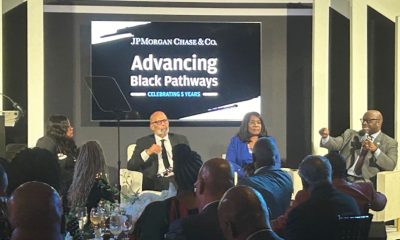Family
New Survey Shows a Third of Teens Believe They won’t be Financially Independent by the Age of 30
MILWAUKEE COURIER — A survey released by Junior Achievement and Citizens Bank states that 63 percent of teens don’t believe they will be financially independent from their parents by the age of 30.
By Rhea Riley
A survey released by Junior Achievement and Citizens Bank states that 63 percent of teens don’t believe they will be financially independent from their parents by the age of 30.
The survey was conducted by Wakefield Research on 1,000 teens between the ages of 13 to 18 who are not enrolled in college. Teens were invited to take the survey via email between March 1– 8 of this year. The survey was released to coincide with April as it is the national financial literacy month.
“These survey findings show a disconcerting lack of confidence among teens when it comes to achieving financial goals,” said Michael Frohna, president of Junior Achievement of Wisconsin. “With a strong economy, you would think teens would be more optimistic. It just demonstrates the importance of working with young people to help them better understand financial concepts and gain confidence in their ability to manage their financial futures.”
Junior Achievement is a worldwide organization dedicated to educating youths on making successful academic and economic choices for their futures. Through corporate and community volunteers, the nonprofit organization programs reach an estimated 4.8 million students a year in the United States and 5.2 million worldwide. Of these locations, Junior Achievement has programs with 4,000 different classrooms at 380 different schools across the metropolitan Milwaukee area.
The organization’s programs focus on three pillars, career readiness, entrepreneurship and financial literacy.
As a nonprofit, Junior Achievement conducts frequent surveys and evaluations to assess their impact. The results of these surveys and evaluations are crucial—not only do they gauge the effectiveness of their work and address needed changes, but they also reassure to their donors that their work is making a difference.
This year, Junior Achievement is celebrating 100 years, but with these recent survey results it is evident that their work is far from finished.
The survey also revealed that females expected to make less than $35,000 within their first full-time job after high school. Other results concluded that an average of the students had obtaining a full-time job as their top financial goal, along with paying for college, living on their own and paying taxes.
“These results aren’t what we are hoping, but it shows us how important it is to keep working and to make sure we are providing skills and knowledge when providing financial literacy,” said Tracy Cinealis, Vice President of Program Partnerships.
According to Cinealis, previous surveys stated students who have been involved in Junior Achievement programs are 90 percent more confident in managing their own finances.
Moving forward, Junior Achievement also wants to keep instilling in their students the ability to dream big and not limit their opportunities. They also look forward to expanding the conversation on budgeting with their students and encourage dialogue with their parents on managing their finances.
“More than anything we want students to know that anything is possible,” said Cinealis. “We want them to dream big and we want them to feel confident that whether they go to a four-year college, or a two-year technical school or go straight into the work force that they have unique and meaningful opportunities.”
Along with educating students in financial literacy, Junior Achievement wants to prepare their students for bright futures. By looking toward even more partnerships with other organizations within the Milwaukee area, they hope to dismantle the idea that their students will be financially dependent for so long.
“I think our partnerships with other Milwaukee area organizations are going to be key if we want to try to help our employers make sure they get the best employees,” said Cinealis on prepping their students for future full-time jobs. “We want to make sure our Wisconsin residents have great Wisconsin jobs.”
To learn more about Junior Achievement, visit wisconsin.ja.org.
This article originally appeared in the Milwaukee Courier.
Community
Richmond Nonprofit YES Nature to Neighborhoods Plans Major Renovation
Richmond nonprofit YES Nature to Neighborhoods is planning a significant renovation of its headquarters at 3029 Macdonald Ave., around 31st street. The nonprofit serving youth and families in Richmond is requesting a design review permit to demolish the one-story, 2,218-square-foot building and a 95-square-foot shed, and to replace them with a new 4,480-square-foot, two-story building.

The Richmond Standard
Richmond nonprofit YES Nature to Neighborhoods is planning a significant renovation of its headquarters at 3029 Macdonald Ave., around 31st street.
The nonprofit serving youth and families in Richmond is requesting a design review permit to demolish the one-story, 2,218-square-foot building and a 95-square-foot shed, and to replace them with a new 4,480-square-foot, two-story building.
The new building would consist of office and meetings spaces with a 345-square-foot addition to the existing garage on the property, according to city documents. The nonprofit will host youth, adult, and family programming on and off the site.
The nonprofit also proposes to repair sidewalks, replace planters and a fence, add lighting, and provide interior open space, among other improvements.
The city’s Design Review Board was set to review the plans at its meeting this evening on April 10. For more info, go to https://www.ci.richmond.ca.us/DocumentCenter/View/68830/3_PLN23-316-3029-MacDonald-Ave_DRB20240410—Apr-10
Community
Families Flock to New Farmers Market in Marina Bay
The City of Richmond’s first farmers market in Marina Bay kicked off Sunday, April 7 with a large swell of community members coming out to enjoy the occasion. The long-anticipated market set up shop in the parking lot off Regatta Boulevard and Melville Square in Richmond and featured music and dancing, arts and crafts, chess, multiple vendors and some fresh produce from 10 a.m. to 2 p.m.

By Kathy Chouteau
The Richmond Standard
The City of Richmond’s first farmers market in Marina Bay kicked off Sunday, April 7 with a large swell of community members coming out to enjoy the occasion.
The long-anticipated market set up shop in the parking lot off Regatta Boulevard and Melville Square in Richmond and featured music and dancing, arts and crafts, chess, multiple vendors and some fresh produce from 10 a.m. to 2 p.m.
Numerous families turned out for the event, many with their children and family dogs.
The market will continue on Sundays and is operated by the Richmond Certified Farmers Market Association. For more information or to become a vendor, go to https://cirichmondca-newsletter.app.transform.civicplus.com/forms/39634
Community
For Cervical Cancer Month, Medical Community Focused on Education
January was Cervical Cancer Awareness Month. Physicians, advocates and others in the medical community commemorated the month by raising awareness about a form of cancer they say is highly preventable and treatable. Cervical cancer is caused by a virus called the human papillomavirus (HPV) and it develops slowly over time but can be prevented with proper care in girls as young as 13 years old.

By Magaly Muñoz
January was Cervical Cancer Awareness Month.
Physicians, advocates and others in the medical community commemorated the month by raising awareness about a form of cancer they say is highly preventable and treatable.
Cervical cancer is caused by a virus called the human papillomavirus (HPV) and it develops slowly over time but can be prevented with proper care in girls as young as 13 years old.
Sonia Ordonez, an OBGYN and gynecology surgeon at Kaiser Permanente, stated that as soon as people with cervixes reach the maturity reproductive age, they should start taking preventative measures like getting the HPV vaccine. The vaccine involves a series of two-doses for people aged 9 through 14 or three-doses for people 15 through 45 years old.
“I see a lot of young women who can’t remember or may not have gotten [the vaccine] when they were younger, or maybe got one, but we can give them the series of vaccines and restart at any point in time,” Ordonez said.
She said that cervical cancer is not the only cancer caused by HPV. Strains of the virus can also lead to throat, anal and penile cancers.
Screening is also an effective way to check for cervical cancer and should be done every three years after someone turns 21, doctors recommend. It is best to start as early as possible to catch occurrences early.
Ordonez said that this cancer is also more likely found in people of color and has led to more deaths overall.
A Mayo Clinic article published last month stated that Black women are more likely to be diagnosed and die of cervical cancer, compared to White women in the U.S.
2,000 Black women are diagnosed every year with cervical cancer and 40% die as a result.
“This disparity is not due to genetic differences among White, Black or Hispanic women, but rather related to systemic racism, access to healthcare and socioeconomic factors,” Dr. Olivia Cardenas-Trowers, a Mayo Clinic urogynecologist, said in the article.
Ordonez stated that immigrant women are also highly susceptible to the cancer, as many Latin American countries may not have accessibility to screenings or lack of insurance makes it harder for them to get tested.
Hispanic women are 40% more likely to be diagnosed with cervical cancer, and 30% more likely to die from it, as compared to non-Hispanic White women, according to the Office of Minority Health.
Family medicine physician, Joy Anyanwu, stated that the pandemic contributed to hesitancy about getting cervical cancer screenings among some women. Other factors are people’s aversion to vaccines, parents not wanting to believe that their children are or will become sexually active, and doubt about the overall effectiveness of the vaccine.
“The vaccine is very safe — over 97% effective in preventing cervical cancer,” Anyanwu said. “Even if you aren’t having sex, the earlier you start would actually help.”
Anyanwu said she understands that parents might not want to ask questions about their children’s reproductive health, but it’s a mindset that can be a barrier to having important conversation about prevention or care.
To keep families their families and communties healthy, the doctor emphasized that people should prioritize keeping up with their vaccine series and going to screenings every year.
-

 Activism4 weeks ago
Activism4 weeks agoOakland Post: Week of March 27 – April 2, 2024
-

 #NNPA BlackPress4 weeks ago
#NNPA BlackPress4 weeks agoCOMMENTARY: D.C. Crime Bill Fails to Address Root Causes of Violence and Incarceration
-

 #NNPA BlackPress4 weeks ago
#NNPA BlackPress4 weeks agoMayor, City Council President React to May 31 Closing of Birmingham-Southern College
-

 #NNPA BlackPress4 weeks ago
#NNPA BlackPress4 weeks agoBeloved Actor and Activist Louis Cameron Gossett Jr. Dies at 87
-

 Community1 week ago
Community1 week agoFinancial Assistance Bill for Descendants of Enslaved Persons to Help Them Purchase, Own, or Maintain a Home
-

 Activism3 weeks ago
Activism3 weeks agoOakland Post: Week of April 3 – 6, 2024
-

 Business1 week ago
Business1 week agoV.P. Kamala Harris: Americans With Criminal Records Will Soon Be Eligible for SBA Loans
-

 Activism2 weeks ago
Activism2 weeks agoOakland Post: Week of April 10 – 16, 2024























































